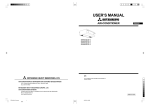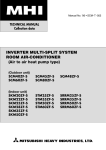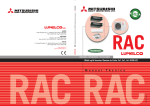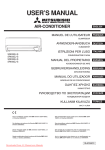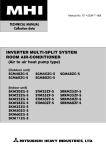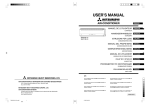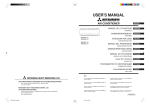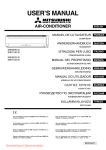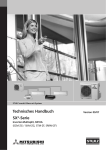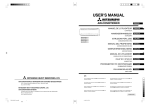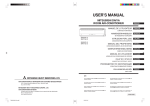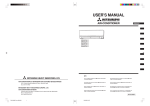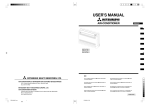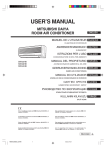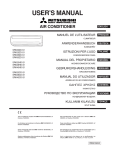Download Mitsubishi Heavy Industries STM25ZF-S User`s manual
Transcript
USER’S MANUAL AIR-CONDITIONER ENGLISH MANUEL DE L’UTILISATEUR FRANÇAIS CLIMATISEUR ANWENDERHANDBUCH DEUTSCH ¨T KLIMAGERA ISTRUZIONI PER L’USO STM25ZF-S STM35ZF-S STM50ZF-S STM60ZF-S ITALIANO CONDIZIONATORE D’ARIA MANUAL DEL PROPIETARIO ESPAN˜OL ACONDICIONADOR DE AIRE GEBRUIKERSHANDLEIDING NEDERLANDS AIRCONDITIONING MANUAL DO UTILIZADOR PORTUGUÊS APARELHO DE AR CONDICIONADO √¢∏°π∂™ Ã∏™∏™ ∂§§∏¡π∫∞ ∫§πª∞∆π™∆π∫√ РУКОВОДСТВО ПО ЭКСПЛУАТАЦИИ РУССКИЙ КОНДИЦИОНЕР ВОЗДУХА KULLANIM KILAVUZU SPL‹T KL‹MA This air conditioner complies with EMC Directive 89/336/EEC, LV Directive 73/23/EEC. Este acondicionador de aire cumple con la directiva EMC: 89/ 336/EEC, LV Directiva 73/23/EEC. Ce climatiseur est conforme à la Directive EMC: 89/336/EEC, LV Directive 73/23/EEC. Deze airconditioner voldoet aan EMC Directive 89/336/EEC, LV Directive 73/23/EEC. Dieses Kimagerät erfüllt die EMC Direktiven 89/336/EEC, LV Direktiven 73/23/EEC. Este aparelho de ar condicionado está em conformidade com a Directiva EMC 88/336/CEE e a Directiva LV 72/23/CEE. Questo condizionatore d’aria è conforme alla Direttiva EMC: 89/ 336/EEC, LV Direttiva 73/23/EEC. ∞˘Ùfi ÙÔ ÎÏÈÌ·ÙÈÛÙÈÎfi Â›Ó·È Û‡ÌʈÓÔ Ì ÙȘ ÚԉȷÁڷʤ˜ Ù˘ √‰ËÁ›·˜ EMC 88/396 Î·È Ù˘ √‰ËÁ›·˜ LV 73/23 Ù˘ ∂√∫. RJH012A011 TÜRKÇE Thank you for purchasing a MITSUBISHI HEAVY INDUSTRIES, LTD. Air-Conditioner. To get the best long-lasting performance, read and follow this User’s Manual carefully before using your air-conditioner. After reading, please store the Manual in a safe place and refer to it for operational questions or in the event of any irregularities. This air-conditioner is intended for domestic use. An alternative refrigerant (R410A) is used in this air-conditioner. When asking the dealer for service or inspection and maintenance, explain the dealer about this matter. ENGLISH Contents Safety precautions......................................................................................................................... 2 Choice of operations and features ................................................................................................ 4 Name of each part and its function ............................................................................................... 5 Operation and indication section for remote control .................................................................... 7 AUTO mode operation procedure ................................................................................................ 8 Temperature adjustment during AUTO ........................................................................................ 8 COOL/HEAT/DRY mode operation procedure ........................................................................... 9 Concerning HIGH POWER operation ......................................................................................... 9 Concerning ECONOMY operation .............................................................................................. 9 Air flow direction adjustment procedure .................................................................................... 10 About FAN SPEED .................................................................................................................... 10 OFF-TIMER operation procedure .............................................................................................. 11 ON-TIMER operation procedure................................................................................................ 11 PROGRAM TIMER operation procedure .................................................................................. 12 About TIMER operation ............................................................................................................. 12 Present time setting procedure .................................................................................................... 12 Emergency run operation............................................................................................................ 13 Remote control handling procedure ........................................................................................... 13 When the operation fails with the remote control ...................................................................... 14 Operating hints ........................................................................................................................... 14 Maintenance................................................................................................................................ 15 Has the unit been installed correctly? ......................................................................................... 16 About the Multiple Air-conditioner ............................................................................................ 16 Troubleshooting .......................................................................................................................... 17 Please remember! ....................................................................................................................... 17 When to contact your distributor without delay ......................................................................... 18 Air-conditioner operating conditions.......................................................................................... 19 Power Blackout Auto Restart Function ...................................................................................... 19 Characteristics of HEAT mode operation .................................................................................. 19 Self diagnosis function ............................................................................................................... 20 –1– Safety precautions • Before starting to use the system, please read these “Safety precautions” carefully to ensure proper operation of the system. • The safety precautions are classified as “ DANGER” and “ CAUTION”. Precautions as shown in the column “ DANGER” indicate that improper handling could have dramatic consequences like death, serious injury, etc. Nevertheless, even precautions as shown in the column “ CAUTION” might pose a serious problem, depending on the circumstances. Please observe these precautions with great care, since they are essential to your safety. • Symbols which appear frequently in the text have the following meaning: Observe instructions with great care Strictly prohibited Provide positive earthing • When you have read the instruction manual, please keep it near at hand for consultation. If someone else takes over as operator, make certain that the manual is also passed on to the new operator. ❚ INSTALLATION PRECAUTIONS DANGER The system is meant for domestic, residential etc. use. The system must be installed by your dealer or a qualified professional. If used in inferior environments, such as an engineering workplace, the equipment may function poorly. It is not advisable to install the system yourself, as faulty handling may cause leakage of water, electric shock or fire. CAUTION Do not install near places where inflammable gas may leak. Depending on the place of installation, a circuit breaker may be necessary. LPG Gas leaks may cause fire. If you don’t fit a circuit breaker, you may cause an electric shock. Make sure that you drain the hose properly, so that all the water has dripped out. Make sure that the system has been properly earthed. Negligence may cause flooding in the room resulting in wet furniture. Earth cables should never be connected to a gas pipe, municipal water pipe, lightning conductor or telephone earth cable. Incorrect installation of the earth cable may produce an electric shock. ❚ OPERATION PRECAUTIONS DANGER Do not expose yourself to the cooling air for prolonged periods. Do not insert anything into the air inlet. Store the remote control out of reach of infants. This could affect your physical condition and cause health problems. This may cause injury, as the internal fan rotates at high speed. Failure to observe this may result in the batteries being swallowed or other accidents. Only use approved fuses. Do not handle the switches with wet hands. Don’t swing from the system. Use of steel or copper wire instead of an approved fuse is strictly forbidden, as it may cause a breakdown or fire. This may cause an electric shock. If the system falls down, you may get injured. CAUTION –2– Safety precautions CAUTION Do not place a combustible insecticide or paint spray near the blower, nor aim it directly at the system. You should not expose any combustion appliance directly to the air stream of the air-conditioner. Do not wash the air-conditioner with water. This may result in a fire. The appliance may then work inadequately. This could cause an electric shock. The system should only be used for its original purpose and not for anything else like, for instance, preservation of food, plants or animals, precision devices or works of art. Do not place anything containing water, like vases, on top of the unit. Do not install the system at a place where the air stream of the blower is aimed directly at plants or animals. The system is only intended for use in ordinary domestic rooms. Any other use of the system may damage the quality of food, etc. Water entering the unit could damage the insulation and therefore cause an electric shock. This will damage their health. Do not sit on the outdoor unit nor put anything on it. After a long period of use, check the unit's support structure from time to time. Do not touch the aluminum fins on the air heat exchanger. If the unit falls down or things drop off it, people could get hurt. If you don't repair any damage straightaway, the unit may fall down and cause personal injury. Failure to observe this may result in injury. If you operate the system together with a combustion appliance, you must regularly ventilate the indoor air. Stand firmly on a stepladder or other stable object when removing the inlet grill and filters. When you clean the system, stop the unit and turn off the power switch. Insufficient ventilation may cause accidents due to oxygen deficiency. Failure to observe this may result in injury through insecure objects toppling over. Never clean the unit while the internal fan is rotating. Do not place objects near the outdoor unit or allow leaves to gather around the unit. If there are objects or leaves around the outdoor unit, small animals may enter unit and contact electrical parts resulting in break down, emission of smoke or flame. ❚ PRECAUTIONS FOR TRANSFER OR REPAIRS DANGER Consult your dealer for repairs to the system. If the air-conditioner is moved elsewhere, contact your dealer or a professional fitter. If you notice anything abnormal (smell of burning, etc.), stop the system, turn off the power switch and consult your dealer. Wrong repairs could cause an electric shock, fire, etc. Faulty installation may cause water leakage, electric shock, fire, etc. Continued use of the system in abnormal circumstances may result in malfunctioning, electric shock, fire, etc. –3– Choice of operations and features Choice of operations HEAT Page 9 COOL The unit draws in heat from the outside air, transfers it inside and heats the room. DRY Page 9 Cooling by extracting heat from the room. Page 9 AUTO Page 8 Automatic selection of operating mode. Drying by extracting damp from the room. The Auto mode automatically selects the operation mode (HEAT, COOL or DRY), depending on the room temperature when switched on. Functioning of microcomputer depends on setting and room temperatures. It dehumidifies while keeping room temperature almost constant. Features Amenity facility Page 12 When using the timer to switch on, the system become operational shortly before the set time, depending on the room temperature so that the desired temperature is reached at the set time. Adjustment of airflow TIMER procedure Page 11,12 There are two timers, for ON and OFF. They can be set as desired. Page 10 HIGH POWER mode Page 9 Turning up the power operates the air-conditioner in the power cooling and heating mode. ECONOMY mode Page 9 • AIR SCROLL This function sets the unit at the most suitable angle for blowing, imitating a natural breeze. • MEMORY FLAP Once the flap position has been set, the unit will memorise it and continue in the same position the next time. –4– This is an economic and healthy level of operation. Name of each part and its function INDOOR UNIT STM25ZF-S STM35ZF-S STM50ZF-S STM60ZF-S Air inlet grill Draws in the indoor air. Air filter Removes dust or dirt from the inlet air. Page 15 Air outlet Air blows out of here. Air flow direction adjustment flap Page 10 Unit indication & operation section Remote control signal receiver Drain hose Drains water from the dehumidified air. Refrigerant piping connection electric flex Wireless remote control Page 7 OUTDOOR UNIT SCM40ZF-S SCM45ZF-S SCM80ZF-S SCM48ZF-S SCM60ZF-S Air inlet (on side & rear surface) Air outlet –5– Unit indication section ECONO light (orange) Remote control signal receiver Illuminates during ECONOMY operation. HI POWER light (green) Unit ON/OFF button Illuminates during HIGH POWER operation. TIMER light (yellow) RUN (HOT KEEP) light (green) Illuminates during TIMER operation. • Illuminates during operation. • Blinks at air flow stop due to the ‘HOT KEEP’. Page 17 Unit ON/OFF button In emergencies, this button can be used for turning on/off the unit when remote control is not available. Page 13 Unit ON/OFF button –6– Operation and indication section for remote control Operation section FAN SPEED button Each time the button is pushed, the cator is switched over in turn. OPERATION MODE select button indi- Each time the button is pushed, the cator is switched over in turn. indi- ON/OFF button HI POWER button Press for starting operation, press again for stopping. This button changes the HIGH POWER mode. Page 9 ECONO button AIR FLOW button This button changes the ECONOMY mode. Page 9 This button changes the flap mode. When pressed, this button changes the mode in the following order: TEMPERATURE button (Air scroll) (Swing) This button sets the room temperature. (This button changes the present time and TIMER time.) (Flap stopped) Page 10 CANCEL button ON TIMER button This button cancels the ON timer and OFF timer. This button selects ON TIMER operation. Page 11 RESERVE button This button sets the present time and TIMER time. TIME switch This switch for setting the time. RESET switch Page 12 Switch for resetting microcomputer. OFF TIMER button This button selects OFF TIMER operation. • The above illustration shows all controls, but in practice only the relevant parts are shown. Page 13 Page 11 Indication section ECONOMY MODE indicator HIGH POWER MODE indicator Indicates during economy mode operation. Indicates during high power mode operation. HI POWER TEMPERATURE indicator Indicates set temperature. (Does not indicate temperature when operation mode is on AUTO) AUTO HI MED LO ECONO AM PM OPERATION MODE indicator Indicates selected operation with [ ON (Auto) • (Cool) • lamp. (Heat) • (Dry)] OFF FAN SPEED indicator Indicates set air flow rate with lamp. AIR FLOW indicator TIME indicator Shows selected flap mode. Indicates present time or timer setting time. OFF TIMER indicator ON TIMER indicator Indicates during OFF TIMER operation. Indicates during ON TIMER operation. Transmission procedure When each button on the remote control is pressed – with the remote control pointing towards the air-conditioner unit – a signal is transmitted. When the signal is received correctly, the unit will beep. –7– AUTO mode operation procedure ■ Automatically selects the operation mode (HEAT, DRY, COOL) depending on the room temperature when switched on. Aim the remote control at the air-conditioner. 1 2 Press the ON/OFF button. When the unit is not in AUTO mode: Press MODE button. Move the [ mark] to the To stop: NOTE • Air is not blown out during the operation. Page 17 (Auto) position. Press the ON/OFF button. AUTO mode can be operated by simply pressing the ON/OFF button. • Simultaneous automatic operation. Page 16 • If you don’t want the AUTO mode programme, change to HEAT, DRY or COOL instead of AUTO. Page 9 Air flow direction adjustment procedure. Page 10 Temperature adjustment during AUTO Air temperature adjustment is possible even during automatic operation. There are 6 levels of adjustment possible with the COOL WARM Press the button or the Press the button. button. When a change in temperature is desired. 1 Press the or button. button is pushed, the switch over occurs in the following order –6 → –5 → ............ –1 → ±0 → +1 ............ +6. ■ Each time the button is pushed, the indicator does not change. When +6 is indicatored, even if the button is pushed, the switch over occurs in the following order +6 → +5 → ............ +1 → ±0 → –1 ............ –6. ■ Each time the button is pushed, the indicator does not change. When –6 is indicatored, even if the –8– button. COOL/HEAT/DRY mode operation procedure Aim the remote control at the air-conditioner. 1 2 Press the ON/OFF button. Press the MODE select button. Move the [ mark] to the desirable operation position. (Cool), 3 (Dry) Press the TEMP button. 26°C~28°C 22°C~24°C DRY button for the desired temperature. HEAT COOL Press or Standard 4 Air flow direction adjustment procedure. (Heat), 21°C~24°C Press the FAN SPEED button Set the air flow rate as desired. Page 10 To stop: NOTE Press the ON/OFF button. Program changing procedure Set the new program. • The operation program can also be set or changed when the air-conditioner is not in operation. • Air is not blown out during the operation. Page 17 • The air-conditioners cannot be in different operating modes at the same time, such as one unit being in the “Cool” mode and one unit being in the “Heat” mode. Concerning HIGH POWER operation Pressing the HI POWER button intensifies the operating power and initiates a powerful cooling or heating operation for 15 minutes continuously. The remote control “HI POWER” illuminates but the wind capacity display is erased. ▲ NOTE • During the HIGH POWER operation, the room temperature is not controlled. When it causes an excessive cooling or heating, press the HI POWER button once more to cancel the HIGH POWER operation. • HIGH POWER operation is not available during the DRY operation. • During ON timer operation, HIGH POWER operation will start when the ON time is reached. • When the following operations are conducted HIGH POWER operation will be canceled. 1 When the HI POWER button is pressed again. 2 When the operation mode is changed. 3 When ECONOMY operation is conducted. Concerning ECONOMY operation Pressing the ECONO button initiates a soft operation with the power suppressed in order to avoid an excessive cooling or heating. The unit operates 1.5°C higher than the setting temperature for the weak wind capacity during cooling or 2.5°C lower than that during heating. A message “ECONO” is ▲ displayed on the remote control. The wind capacity display is erased. NOTE • If the ECONOMY operation is selected while operating with the strong or medium wind capacity, it takes about 1 minute before the wind capacity drops to the weak level. • When the following operations are conducted ECONOMY operation will be canceled. 1 When the ECONO button is pressed again. 2 When HIGH POWER operation is selected. –9– Air flow direction adjustment procedure Adjusting up/down air flow direction ■ Up/down direction can be adjusted with the AIRFLOW button on the remote control. Each time when you press this button the mode changes as follows: Change to AIRFLOW mode. (Swing) (Air scroll) (Flap stopped) Air scroll In COOL and DRY operation Stops at this position for 5 seconds. SWING FLAP In HEAT operation Stops at this position for 5 seconds. Flap moves up and down continuously. Thick line Thin line : moves quickly : moves slowly Thick line Thin line : moves quickly : moves slowly NOTE • If the room temperature control (thermostat) switches to the heating mode or if the defrosting operation is on, the blow flap changes automatically to a horizontal position. • If the heating operation has just started and the room temperature is still low, it may take a while before the flap moves to the above sway operation angle. • The flap may stop at the tilted down-blow position during the “sway operation” in the heating mode. MEMORY FLAP (FLAP STOPPED) When you press the AIRFLOW button once while the flap is operating, it stops swinging at an angle.Since this angle is memorized in the microcomputer, the flap will automatically be set at this angle when the next operation is started. • Recommended angle of the flap when stopping HEAT (Slant forward blowing) COOL, DRY (Horizontal blowing) DANGER • Avoid constant airflow to the body for hours on end. CAUTION • When in COOL or DRY operation, do not operate for hours on end with the air flow blowing straight down. Otherwise, condensation may appear on the outlet grill and drip down. • Do not try to adjust the flaps by hand, as the control angle may change or the flap may not close properly. About FAN SPEED ■ You can choose the capacity of your air-conditioner when heating or cooling. Operation capacity by your choice Set automatically by microcomputer Powerful operation with high capacity Standard operation Energy-saving operation FAN SPEED NOTE AUTO HI MED LO • When changing FAN SPEED from HI to LO, the sound of refrigerant flowing may be heard. – 10 – OFF-TIMER operation procedure ■ The unit stops automatically at the end of the set period of time. Example: You wish it to stop PM 10:30. If the air-conditioner is not operating, aim the remote control at the air-conditioner. 1 2 Press the ON/OFF button. Press the OFF TIMER button. OFF TIMER indicator 3 Press the “ or Each time the is blinking. ” button. button is pressed, the indicator is switched in the order of: AM 0:00 AM 0:10 Each time the AM 0:00 OFF AM 0:20 ... AM 1:00 AM 1:10 ... button is pressed, the indicator is switched in the order of: PM 11:50 PM 11:40 ... PM 11:00 PM 10:50 ... Set at PM 10:30. Changing of set time Set a new time by using the OFF TIMER button. 4 Press the RESERVE button. The indication changes from blinking to steady lighting and the setting is complete. The timer light (yellow) is on. ⇓ Releasing procedure • The unit stops at the end of the set period of time. Press the CANCEL button to turn off the timer indicator. ON-TIMER operation procedure ■ If the room temperature is at near optimum temperature at the set time, the operation starts 5 to 60 minutes before the set time. Page 12 Example: In the case you wish to bring the temperature to nearly set temperature in at AM 8:00. 1 Press the ON TIMER button. ON TIMER indicator 2 ON is blinking. Press the “ or Each time the button is pressed, the indicator is switched in the order of: AM 0:00 AM 0:10 Each time the AM 0:00 ” button. AM 0:20 ... AM 1:00 AM 1:10 ... button is pressed, the indicator is switched in the order of: PM 11:50 PM 11:40 ... PM 11:00 PM 10:50 ... Set at AM 8:00. 3 Press the RESERVE button. The indication changes from blinking to steady lighting and the setting is complete. The timer light (yellow) is on. ⇓ • Operation starts 5 to 60 minutes before the set time. • The TIMER light goes out at the set time. Changing of set time Releasing procedure Set a new time by using the ON TIMER button. Press the CANCEL button to turn off the timer indicator. – 11 – PROGRAM TIMER operation procedure ■ The timer operations that consist of the combination of the timer being set at both on and off. Once this has been set and operations started, operations will commence and end at the same time every day as long as the ON/OFF button is not pressed. Example: When it is desired to stop at 10:30 PM, and then start operation at 8:00 AM, near the set temperature. 1 Press the ON/OFF button. ■ OFF TIMER operation setting Set by the procedures on page 11. PM Set to . OFF ■ ON TIMER operation setting Set by the procedures on page 11. AM Set to . ON The setting of the lighting of the timer light (yellow) of this unit is complete. The time will be displayed on the remote control unit. The display will change depending on the operational status. ON OFF ON (Stopped) OFF (Operating) Changing of set time Releasing procedure Set a new time by using the OFF TIMER or ON TIMER button. Press the CANCEL button to turn off the timer indicator. About TIMER operation ▼ ▼ About Amenity facilities In COOL operation (Stop) Operation starts Amenity facilities enable to start the operation a little earlier, so that the room approaches optimum temperature at ON time when the operation is started by ON-TIMER. • Mechanism The room temperature is checked 60 minutes before the timer is at ON. Depending on the temperature at that time, the operation starts 5 to 60 minutes before the timer is at ON. • The Amenity facility only functions for COOL and HEAT operation mode (including AUTO). It does not work for DRY mode. (Operation) Set temperature Check the room temp. 60 mins. in advance. Set time Present time setting procedure ■ When inserting the batteries, the present time is automatically set to PM 1:00. Example: Set to AM 10:30. 1 Press the TIME switch. 2 Press the “ Press with the tip of a ballpoint pen, etc. The time indicator blinks and can be set to the current time. or ” button. (Set to AM 10:30) 3 Press the RESERVE button. Press within 15 sec.! The indication changes from blinking to steady lighting and the setting is complete. NOTE The timer is set on the basis of the present time, so please set it correctly. – 12 – Emergency run operation • The unit ON/OFF button on the unit operates ON/OFF temporarily when the remote control is not used. Operation program • OPERATION MODE : AUTO • FAN SPEED : AUTO • AIR FLOW : AUTO • Operation starts by pressing the unit ON/OFF button; it stops if you press the button again. Unit ON/OFF button Remote control handling procedure Replacing the batteries The following cases signify exhausted batteries. Replace old batteries with new ones. • Receiving beep is not emitted when a signal is transmitted. • Indicator fades away. 1 Remove back lid and take out old batteries. 2 Insert new batteries. (SUM-4 or R03x2) ■ When the indicator shows any abnormal condition, press the reset switch with the tip of a ballpoint pen. NOTE • Don't use old and new batteries together. • Remove the batteries when the remote control is not used for a long period. • The life of a battery conforming to JIS or IEC is 6 to 12 months with normal use. If used longer, or when an unspecified battery is used, liquid may leak from the battery, causing the remote control to malfunction. Attention to the , and . marks • On the battery is printed its expected life. This may be shorter than that of the air-conditioner, depending on the date of manufacture. • However, the battery may still be in working order after expiry of its nominal life. 3 Close back lid. 4 Press the reset switch with the tip of a ballpoint pen. Using the remote control holder The remote control can be attached to a wall or pillar by using a remote control holder. Before installing the remote control, check that the air-conditioner receives the signals properly. For installing or removing the remote control, move it up or down in the holder. – 13 – Warning note for remote control handling • Don’t go near high temperature places, such as an electric carpet or stove. • Don’t leave the remote control exposed to direct sunlight or other strong lighting. • Don’t drop the remote control. Handle with care. • Don’t put any obstructing obstacles between the remote control and the unit. • Don’t spill water etc on the remote control. • Do not place heavy objects on the remote control, or step on it. When the operation fails with the remote control • Are the batteries running down? Page 13 Replace the batteries with new ones and repeat the operation. • If the operation still fails, handle as per emergency run operation. Contact your dealer. Page 13 Operating hints ■ Please observe the following for the most economic and comfortable use of your unit. Clean the filters frequently. Avoid direct sunlight and draught. Excessively high or low temperatures are not good for your health and waste electricity. Clogged filters may block the air flow and cause less efficient operation. Please request cleaning of the air filter from special contractor. Cut out direct sunlight by drawing the curtains or blinds when cooling. Keep windows and doors shut, except when ventilating. Adjust the airflow direction properly. Operate the unit only when needed. Generate little heat when cooling. Adjust the up/down and left/right airflow to ensure a steady room temperature. Use the timer properly to operate the unit only when needed. Keep heat sources out of the room as much as possible. Set a suitable room temperature. suitable temperature – 14 – Maintenance Before maintenance Turn off the power switch. Don’t spill water. Don’t use the following articles: • Wipe the unit with a soft, dry cloth. There's a danger of electric shock. • Hot water (40°C or more) It may deform or discolour the unit. • Petrol, paint thinner, benzine or polishing agents, etc. They may deform or scratch the unit. During the operational season Cleaning the air filter Please request cleaning of the air filter from special contractor. NOTE Cooling/heating is affected by an air filter clogged up with dust etc., and the operation noise becomes louder. It may also use extra electricity. Please clean the air filter at appropriate intervals. At the beginning of the season At the end of the season 1 Set the temperature setting for approximately a half day at 30°C and perform the cooling operation. 1 Make certain that there are no obstacles blocking the air flow around the air intake and outlet openings of the indoor and outdoor units. 2 3 4 5 6 Check the installation base for corrosion or rust. Dry the inside of the unit. 2 Stop the unit and turn off the power switch. 3 4 5 Clean and reinstall the air filters. The unit uses appr. 5W even when the power switch has been turned off during the off-season for safety or for saving energy. Clean both the indoor and outdoor units. Remove batteries from the remote control. – 15 – Ensure that nothing has snapped and that the earthed flex is not disconnected. Ensure that the air filters are clean. Turn on the power switch. Insert batteries in the remote control. Has the unit been installed correctly? Suitable installation position • Is there any obstruction in front of the indoor unit, preventing proper ventilation and functioning? • Don’t install the unit in any of the following places: • Where there is a danger of leaking inflammable gases. • Where there is substantial splashing of oil. • Malfunctioning due to corrosion may occur if the unit is installed in a spa where sulfide gases are generated, or in a seaside resort exposed to sea breezes. Contact your dealer. • The air-conditioner and remote control must be at least 1 metre away from a TV set or radio. • Drain the dehumidified liquid from the indoor unit into a spot that drains well. Pay attention to operating noises! • • • • When you install the unit, take care to choose a place that can comfortably stand the weight of the unit and does not increase the operating noise or vibration. If there is any likelihood that vibration may be transmitted through the house, fix the unit with the aid of vibration-proof pads between the unit and the fittings. Select a place where cold or hot air and operation noises from the indoor and outdoor units do not cause any inconvenience to your neighbours. Do not leave any obstacles near the outlet and inlet of the outdoor unit. This may cause malfunctioning and increased operating noise. If you hear an irregular noise during operation, contact your dealer. Inspection and maintenance Dependent upon service conditions and operating environment, the inside of the air-conditioner may become dirty after a number of seasons' service (3 to 5 years). This will reduce performance. In addition to normal cleaning, we would recommend inspection and maintenance. (The air conditioner has a longer life without any trouble.) • Contact your dealer, or any distributor, for inspection and maintenance. (There will be a charge for this service). • We would recommend inspection and maintenance to be carried out during the off-season. • If the supply cord of this appliance is damaged, it must only be replaced by a repair shop appointed by the manufacturer, because special purpose tools are required. About the Multiple Air-conditioner Simultaneous Operation • The air-conditioners cannot be in different operating modes at the same time, such as one unit being in the “Cool” mode and one unit being in the “Heat” mode. • When conducting different operations, the air-conditioner that was operated first will be given priority, so the air-conditioner that is operated after that will conduct air blowing operation. • When you want to give priority to the air-conditioner that was started later, either stop the air-conditioner that has priority or cause the operation type of the unit operated first to match that of the unit operated second. Automatic Operation • When the remote control operation switch is in the “Auto” mode the air-conditioner automatically selects either “Cool,” “Dry,” or “Heat” when operation is started depending on the room temperature. • During simultaneous operation of air-conditioner units, operation modes may be automatically changed in response to the temperatures of the individual rooms; this will result in the operation of the outdoor unit being stopped. In such a case, COOL or HEAT mode should be used instead of AUTO. (This is only relevant when more than one air-conditioner unit is being used.) Refrigerant (oil) recovery operation • If the all of the indoor units are not operated at the same time for an extended period, the cooling or heating performance may temporarily decrease. This is in order to control the recovery of the refrigerant (oil) in the stopped indoor unit(s). At this time, the sound of refrigerant flowing may be heard from the stopped indoor unit(s). – 16 – Troubleshooting Please carry out the following checks before making a service call. The air-conditioner does not work at all. Has the power switch been turned off? Has the timer been set in the "ON" position? Is there a power failure or a blown fuse? If the air-conditioner does not operate properly after you have checked the left points, or if any doubt still exists after you have consulted page 17, or if things happen as shown on page 18, switch off the power and contact your dealer. Poor cooling or heating Have you set the thermostat at a suitable temperature? Is the air filter clean? (Not clogged?) Did you leave any doors or windows open? suitable temperature Poor cooling Is there any direct sunlight entering the room? Is there a heat source in the room? Are there too many people in the room? An alternative refrigerant (R410A) is used in this air-conditioner. When asking the dealer for service or inspection and maintenance, explain the dealer about this matter. Please remember! You cannot restart the unit immediately after you have stopped it. Restarting has been blocked for 3 minutes after you have stopped or after switching off the power during operation, to protect the unit. (RUN light is on) Not operating? Please wait for three minutes. The three-minute protection timer in the microcomputer automatically starts up again. Air is not blown out when starting the HEATING operation. Air flow has stopped to prevent blowing out of cold air until the indoor heat exchanger has warmed up. (2 to 5 min.) (HOT KEEP) RUN light blinks slowly (1.5 sec ON, 0.5 sec OFF) Air is not blown out for 5 to 10 min. at HEATING operation. RUN light blinks slowly (1.5 sec ON, 0.5 sec OFF) Air is not blown out when starting the DRY operation. When outdoor temperature is low and humidity is high, the unit sometimes performs defrosting automatically. Please wait. During defrosting, water or steam may escape from the outdoor unit. The indoor fan may stop to prevent re-evaporation of dehumified moisture and to save energy. (RUN light is on) Some steam escapes during COOL operation. This may occur if the room's temperature and humidity are very high. It disappears as soon as the temperature and humidity decrease. – 17 – There is a slight smell. Air blown out during operation may smell. This is caused by tobacco or cosmetics sticking to the unit. You hear a slight gurgling sound. This is caused by refrigerating liquid moving within the unit. You hear a slight cracking sound. This is caused by heat expansion or contraction. After a power cut, you cannot re-start, even if power has been restored, unless you have the power blackout auto restart function. The memory circuit of the microcomputer has been wiped out. Use the remote control to start the operation again. Remote control signals are not received. Remote control signals may not be received if the signal receiver on the air-conditioner is exposed to direct sunlight or other bright light. If so, cut out the sunlight or reduce the other light. Moisture may form on the air outlet grills. If the unit is operated for a long time in high humidity, moisture may form on the air outlet grills and start dripping. FAN operation will be performed even if COOL, DRY, or HEAT have been selected. If one unit is operating in COOL mode while another is in operating in HEAT or any other different operation mode, FAN mode operation will be implemented. Individual operation modes need to be matched. Whistling noise is heard from the outdoor unit. The noise means that the revolution speed is picking up on the compressor. Sometimes a “Shooooo” sound might come for a short time from the unit that is turned off. This is the sound when operation of another indoor unit is stopped. When to contact your distributor without delay Turn off the power switch immediately and inform your dealer in any of the following situations: The fuse or switch blows continuously. The cable becomes extremely hot. The covering of the cable is cracked. CAUTION Fuse often blows. If the power cord becomes damaged, ask your dealer or a qualified engineer to install the replacement to avoid accidents. The TV, radio or other equipment starts to malfunction. A switch does not activate properly. When faulty movement is observed when the ON/OFF button is pressed, even after turning off the power switch and restarting the operation after 3 minutes, the faulty movement does not disappear. You hear a strange noise during operation. The RUN and TIMER lights on the unit indication section blink quickly (0.5 sec. ON; 0.5 sec. OFF) and don’t work. 3 minutes go by, but, why ... – 18 – Air-conditioner operating conditions ■ Use within the following operational range. Operating outside of this range may result in the protection devices being activated, preventing the unit from working. Cooling operation Heating operation Outside temperature Approximately 21 to 43 °C (SCM45,60ZF-S) Approximately -15 to 43 °C (SCM40,48,80ZF-S) Approximately -10 to 21 °C (SCM45,60ZF-S) Approximately -15 to 21 °C (SCM40,48,80ZF-S) Inside temperature Approximately 21 to 32 °C (SCM45,60ZF-S) Approximately 18 to 32 °C (SCM40,48,80ZF-S) Approximately 15 to 30 °C Inside humidity Below approximately 80% The long-term use of the unit with a humidity level exceeding 80% may result in condensation forming on the surface of the indoor unit, leading to water drips. — Power Blackout Auto Restart Function ■ What is power blackout auto restart function? • Power blackout auto restart function is a function that records the operational status of the air-conditioner immediately prior to it being switched off by a power cut, and then automatically resumes operations at that point after the power has been restored. • The following settings will be cancelled: 1 Timer settings 2 HIGH POWER operations NOTE • Ther power blackout auto restart function is set at on when the air-conditioner is shipped from the factory. Consult with your dealer if this function needs to be switched off. • When power failure ocurrs, the timer setting is cancelled. Once power is resumed, reset the timer. Characteristics of HEAT mode operation Mechanism and capacity of HEAT mode operation ■ Mechanism • The unit draws in heat from the cold outside air, transfers it indoors and heats the room. The heating capacity of the heat pump mechanism decreases when the outside air temperature gets colder. • The hot air circulation system takes a while before warming up the room temperature. • If the outside temperature becomes extremely low, it would be better to use an additional source of heating. • If heating operation is performed when the outside temperature is high, room temperature may become higher than the set temperature. Defrosting If the outside temperature becomes low and humidity is high, the heat exchanger in the outdoor unit may frost over, which prevents efficient heating. If this happens, the automatic defroster is activated and during defrosting the heating operation stops for 5 to 10 minutes. • Both indoor and outdoor fans stop and the RUN light (green) blinks slowly (1.5 sec. ON, 0.5 sec. OFF) during defrosting. • The outdoor unit may give off some steam during defrosting. This is to help the defrosting process and is not a defect. • The HEAT operation resumes as soon as defrosting has been completed. – 19 – Self diagnosis function ■ We are constantly trying to do better service to our customers by installing such judges that show abnormality of each function as follows: RUN light Description of trouble Cause 1 time flash Heat exchanger sensor (1) error • Broken heat exchanger sensor (1) wire, poor connector connection • Disconnected sensor 2 time flash Room temperature sensor error • Broken room temperature sensor wire, poor connector connection 4 time flash Drain error • Drain at reverse gradient • Float switch defective 5 time flash Heat exchanger sensor (2) error • Broken heat exchanger sensor (2) wire, poor connector connection • Disconnected sensor 6 time flash Indoor fan motor error • Defective fan motor, poor connector connection 7 time flash Closed service valve Heat exchanger sensor (1) error • Closed service valve • Disconnected sensor Outdoor temperature sensor error • Broken outdoor sensor wire, poor connector connection 2 time flash Outdoor heat exchanger fluid pipe sensor error • Broken heat exchanger fluid pipe sensor wire, poor connector connection 4 time flash Discharge pipe sensor error • Broken discharge pipe sensor wire, poor connector connection 5 time flash Suction pipe sensor error • Broken suction pipe sensor wire, poor connector connection 6 time flash Power transistor sensor error • Broken power transistor sensor wire, poor connector connection 1 time flash Current cut • Compressor locking, open phase on compressor output, shortcircuit on power transistor, closed service valve 2 time flash Trouble of outdoor unit • Broken power transistor, broken compressor wire • Broken discharge pipe sensor wire, poor connector connection • Compressor blockage 3 time flash Over current • Overload operation, overcharge 4 time flash Over heat of power transistor • Cooling problem 5 time flash Over heat of compressor • Gas shortage, defective discharge pipe sensor, closed service valve 6 time flash Error of signal transmission • Defective power supply, Broken signal wire, defective in/outdoor unit boards 7 time flash Outdoor fan motor error • Defective fan motor, poor connector connection 2 time flash Rotor lock • Defective compressor • Open phase on compressor • Defective outdoor unit boards TIMER light ON TIMER light 1 time flash RUN light keeps flashing RUN light ON RUN light 2 time flash – 20 – AIR-CONDITIONING & REFRIGERATION SYSTEMS HEADQUARTERS 16-5, 2-Chome, Kounan, Minato-ku, Tokyo, 108-8215, Japan Fax: (03) 6716-5926 MITSUBISHI HEAVY INDUSTRIES EUROPE, LTD. AIR-CONDITIONER DIVISION 3rd Floor Thavies Inn House 3-4 Holborn Circus London EC1N 2HA, ENGLAND Phone: 44(0)20 7842 8171 Fax: 44(0)20 7842 8104






















